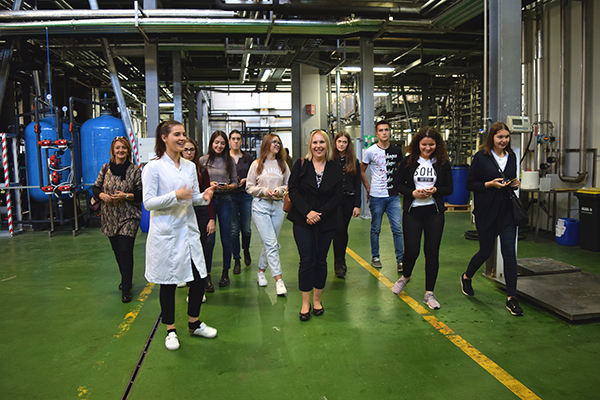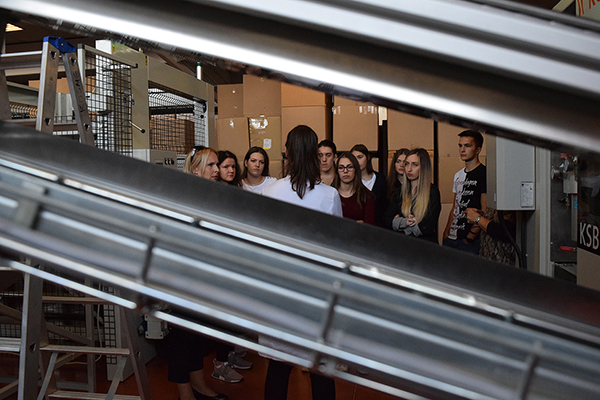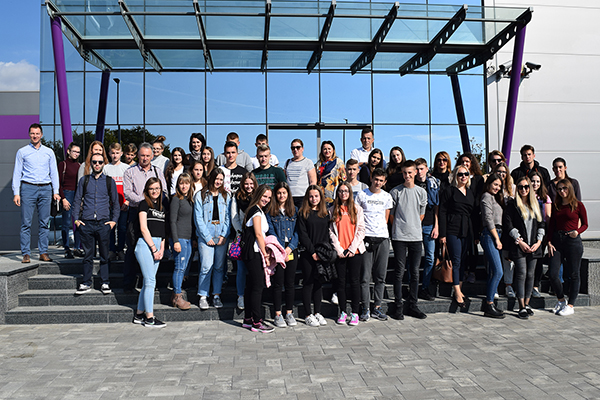 North West Balkans
North West Balkans
Languages
Jobs of the future are in Bosnia and Herzegovina
“When we buy products, we have no idea at all how long it took for that product to get on the shelf from which we simply take it. I am interested in the labs, modern facilities. I could imagine myself working in a company like this, in quality control jobs, working in a laboratory...” a student from the Third Gymnasium Sarajevo Alma is impressed after visiting Violeta, a renowned factory of paper and hygiene products from Grude in Bosnia and Herzegovina.
The visit was organized as part of the implementation of the Enhancing and Advancing Basic Learning and Education in Bosnia and Herzegovina (ENABLE BiH) project supported by USAID BiH, whose main objective is to enable the introduction of STEM principles into the BiH education system.
The students of the final grades of two primary schools, Ninth Elementary School Maoča and Eighth Elementary School Amer Ćenanović Ilidža, and two secondary schools, Gymnasium Vaso Pelagić Brčko and Third Gymnasium Sarajevo, had the opportunity to learn about the modern facilities of the Violeta factory, what kind of technology they use, what it takes to run successful production, and what profiles of professionals Violeta employs.
“This should be a positive example that we should not leave BiH, that we can stay here and change something and invest in progress, technology, in all that is innovative, and thus build a path for ourselves here, develop ourselves, develop the environment,” Alma feels encouraged after the visit.
Her words are confirmed by a nutrition engineer from Violeta, Danijela Alilovic, who says that Violeta is operated under the same conditions as in any other European country.
“Manufacturing is definitely one branch of the industry that can mean a lot to the whole community, from finished products to new jobs and opportunities to thrive. Violeta is really open to any young person who is eager and willing to work... This is where people are supervised, systematically recruited, and have career plan that is made with them, to see what field they want to develop in, what is good for both this person and Violeta. Most of our employees are people who have just graduated,” says Danijela, adding that Violeta employs professionals in various fields, from food and chemical engineers, electrical engineers, economists, lawyers to graphic designers.
Stevan, a high school student Gymnasium Vaso Pelagic from Brcko is impressed with the modern facility.
“This degree of automatisation of the production process has delighted me, everything is at a high level, from the office where everything is created, designed, to the production line, which is almost completely robotic. We were told that only three people maintain complete production and that is astounding information. In a way, I see a similar future for myself. Maybe not exactly in this area, however, I'm planning something related to the robotics because I think it's the future, so I see myself in a similar job.”
Chemistry teacher from the Third Gymnasium Sarajevo, Melisa Tvrtković, believes that visits like this one are extremely important for students.
“Right now, many are still uncertain, regardless of their major in natural science subjects, what type of university studies they would like to pursue. With this visit, we wanted to show them how much the natural sciences are available everywhere, how interesting they are and how practical they are. In Violeta factory, they could really see a lot of things, from quality control, to the analysis such as we did at our school, so they could also relate to some things in chemistry, biology, physics, mathematics, and so on.”
Milan Ljubovic from the Pedagogical Institution of the Department of Education in the Government of the Brcko District believes that the education system needs to be continuously improved, and curricula should be aligned with the latest trends and the latest technology, and that the visit was of multiple use.
“I think this is a real move in light of the kids thinking about staying here and having the opportunity to do something here in the future rather than going abroad,” he points out.
Stevan plans to enroll in the Faculty of Electrical Engineering and hopes to find a job in BiH after graduation. “The situation in BiH is very difficult today, there is little work and generally the trend among young people is to leave. However, if a suitable job is found, a good opportunity, why wouldn’t I stay, this is my home country.”
In order to keep up with technological developments and the demands of the global economy, young people today must master functional knowledge and be able to combine different disciplines into new competences. One of the goals of the ENABLE BiH project is to enable students to become drivers of economic development in BiH and to develop key competences needed for active participation in a knowledge-based economy.


